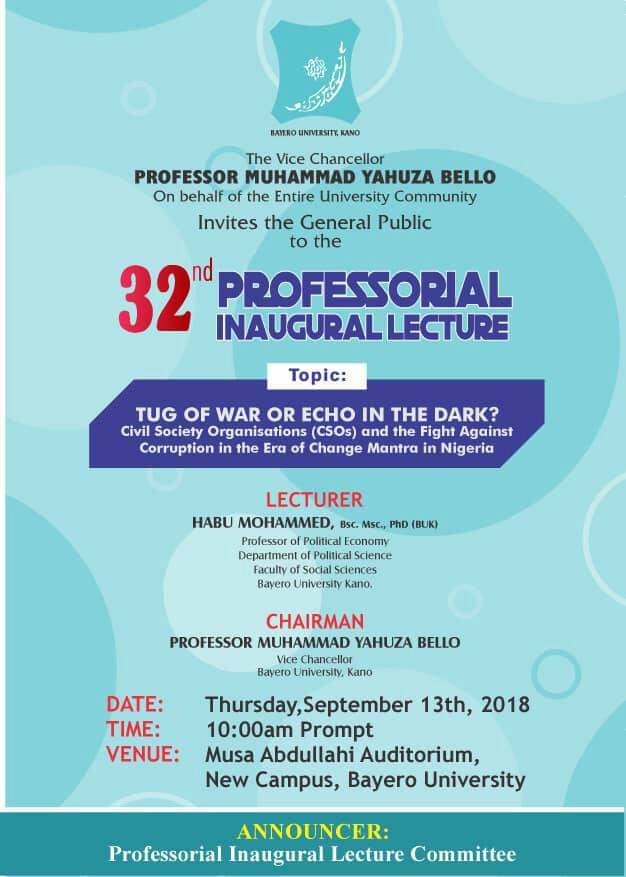
Prof Habu Mohammed
About two weeks ago, it was the Inaugural Lecture at the University of Ibadan that was in the news. The topic is “In Defence of Tradition”, delivered by Professor C B N Ogbogbo, an old war horse of the Department of History at Ibadan. Since then several such lectures might have taken place on a few Nigerian campuses without Intervention being in the know. But not the one at Bayero University, Kano where a much younger scholar, Prof Habu Mohammed chose, for reasons not immediately clear, to swim in the shark infested sea of two turbulent concepts: corruption and the civil society. The title of his presentation is a typical battlefront Political Science: Tug of War Or Echo in the Dark? Civil Society Organisations (CSOs), and the Fight Against Corruption in the Era of Change Mantra in Nigeria”.

 Many who read his presentation would say it a pioneering effort in updating us on the dynamics between the two domains, particularly at a time both domains are equally in the news. The Buhari regime has south to erect itself as the ultimate anti-corruption regime in town. For that reason, corruption related stories dominate the media. The civil society, particularly those Prof Habu calls the anti-corruption CSOs, think they are the only actors in town. So, it is a good time to take them on for any scholar who has made the interface between the two domains his or her key area of scholarly exploration. It is not about whether or not he destabilised any myths. It is that he took it seriously enough to produce a 66 page pdf document on it. It is an empirically dense outing. As a human effort, it could not have been a perfect document. It does not have to be. Or it doesn’t have to be so in an unproblematic sense.
Many who read his presentation would say it a pioneering effort in updating us on the dynamics between the two domains, particularly at a time both domains are equally in the news. The Buhari regime has south to erect itself as the ultimate anti-corruption regime in town. For that reason, corruption related stories dominate the media. The civil society, particularly those Prof Habu calls the anti-corruption CSOs, think they are the only actors in town. So, it is a good time to take them on for any scholar who has made the interface between the two domains his or her key area of scholarly exploration. It is not about whether or not he destabilised any myths. It is that he took it seriously enough to produce a 66 page pdf document on it. It is an empirically dense outing. As a human effort, it could not have been a perfect document. It does not have to be. Or it doesn’t have to be so in an unproblematic sense.
The more substantive issue in the text appears to speak to Political Science, his discipline, more than to the presenter. Of course, Political Science is particularly being challenged left, right and centre for being such a poor replica of what the masters could do with it. That is the Platos, Socrates, Hobbes, Marx, and a host of them. Stuck in the absolutism of the Enlightenment, it is argued to be incompetent in handling a slippery theme as corruption best studied in terms of power relations. But what Robert Cox calls problem solving theory which dominates Political Science till today does not accept the relationality of power. For much of Political Science, power is still somewhere, not everywhere. That being the case, can Political Science confront corruption then?
Academics have difficulty accepting that journalists can or should have anything to do with unpacking an Inaugural Lecture. They are not about to accept the recent lamentation by one of them about the gap between what they write and the people, however we understand people here. Until the current protocol in that regard is wrecked, journalists would let inaugural lectures be, doing no more than announcing one after the other.




























